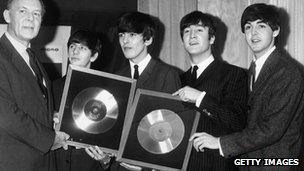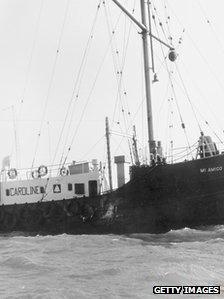The Beatles: All you need is luck
- Published

The Sound of Music outsold every album by The Beatles in the 1960s apart from Sgt Pepper
The success of The Beatles was boosted by factors outside their control, but they were lucky enough to be in the right place at the right time.
According to popular myth, The Beatles almost single-handedly changed the aspirations and fortunes of an entire generation in the 1960s.
What really happened has been romanticised over the past 50 years - almost to the point of historical inaccuracy.
While it is true that The Beatles became iconic, it is improbable they would have had such an impact in any other decade.
Critics say their early recordings were nothing more than pleasant pop tunes and cover versions, although they do concede that, as the group matured, their material became some of the most enduring of the era.
The Beatles reflected what was happening around them and were able to capitalise on it - albeit with the aid of an astute manager and the emergence of a distinct consumer market.
That market catered for the "baby boomers" - children born in the decade after the World War II.
By 1959, baby boomers accounted for 35% of America's population.
But not only had the demographics changed. The world was moving away from the austerity of the post-war years into a period of economic growth.
"Young people found themselves with disposable incomes," says author Steve Gillon.
In his book Boomer Nation: The Largest and Richest Generation Ever and How It Changed America, he says: "American youth had $10 a week to spend in 1954, compared with $2.50 in 1944."
Mark Donnelly, author of Sixties Britain, says: "Even young Britons, who did not grow up with the affluence of their North American counterparts, developed new spending habits."
"A large population of English working-class youth, many of whom had grown up in poverty, suddenly found themselves with small amounts of extra pocket money," he says.
Targeting youth
The growth of television helped fuel the economic boom.
It was the primary medium through which American advertisers reached their target audience.

Dozens of pirate radio station catered exclusively to the young generation
During the 1950s, television sets had become a common item in US households, and young people were targeted with commercials.
"Children could recite the Pepsi-Cola theme song before they learned the national anthem," says Mr Gillon.
In the UK, advertisements were beamed from radio stations on ships anchored 12 miles off the coast, while in France the commercial station Europe No 1 took the decision to create a programme called Salut Les Copains specially for young people.
"Working class youths tended to spend their disposable income on leisure, luxury items and cultural markers, a point that the culture industries were quick to grasp," says Mr Donnelly.
Teenagers wanted to distance themselves from their parents' generation and embraced not only the music, but also the products uniquely aimed at them.
Missed opportunities
When Brian Epstein became the manager of The Beatles, he worked hard to ensure their clean-cut image was maintained - both on and off stage.
"I first encouraged them to get out of leather jackets," he recalled in a television interview. "And after a short time I wouldn't even allow them to appear in jeans. After that, I got them to wear sweaters on stage and eventually, very reluctantly, suits."
His decision to make them wear the trademark collarless suits reflected an ongoing trend introduced by the mods, a British youth sub-culture that had already adopted the Pierre Cardin design on sale in the boutiques that had sprouted in London's Carnaby Street and King's Road.
It was all part of his plan to make The Beatles acceptable, non-threatening, and therefore a saleable commodity - especially in the US.
Mr Epstein went to the US early in 1963 to promote the band, but came away with no results.
When he did finally arrange for the group to visit the US in February 1964, luck was on his side once again. The country was still reeling from the Cuban missile crisis and the assassination of JF Kennedy, and The Beatles provided the perfect distraction.
The popularity of The Beatles also spawned an entire industry of related products - from dolls to bubble-gum cards - a trend mirrored with every popular artist since.
Mr Epstein had vision, but he lacked the business acumen to enable the group to truly profit from their success.
During the first phase of their career, The Beatles themselves received very little financially, if anything, from products marketed in their name,
And although they were selling millions of singles in 1963, the royalty for each record sold was the equivalent of one US cent.
What income they did have was reduced because they fell into the 94% tax bracket - inspiring the song Taxman.
It was noted in the Times newspaper that The Beatles were responsible for more foreign exchange entering the country than anything apart from British cars [the Mini and the E-Type Jaguar being massive sellers] and Scotch whisky.
Things changed later in their career, but it took several years after the release of their first single for The Beatles to benefit from the financial rewards other people reaped at their expense.
- Published4 October 2012